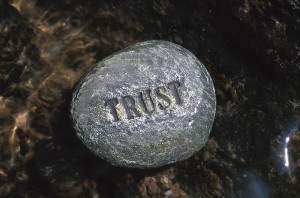 Reputation and trust in the 21st century were the topic of a TED Talk by Rachel Botsman entitled “The Currency of the New Economy is Trust.” She is the author of the book entitled “What’s Mine is Yours: How Collaborative Consumption Is Changing The Way We Live.” In the talk, Rachel commented on the impact of collaborative consumption:
Reputation and trust in the 21st century were the topic of a TED Talk by Rachel Botsman entitled “The Currency of the New Economy is Trust.” She is the author of the book entitled “What’s Mine is Yours: How Collaborative Consumption Is Changing The Way We Live.” In the talk, Rachel commented on the impact of collaborative consumption:
- Collaborative consumption is a social and economic system driven by network technologies that enable the sharing and exchange of assets from spaces to skills to cars in ways and on a scale never possible before.
She explained that advances in technology in our Facebook world of today have created online marketplaces where trust and efficiency are key reasons for growth. In addition, the success of individuals involved in these marketplaces empowers people to make meaningful connections built on personal relationships instead of empty transactions.
Examples of these online marketplaces where just about anything can be shared, swapped, rented, bartered or traded include the following:
- Airbnb – matches people who have space to rent with people who are looking for a place to stay in more than 192 countries – never stay in a hotel again!
- TaskRabbit – you submit a task to complete, TaskRabbits bid on task, you select the winner
- Carpooling.com – share car rides
- Quora – share knowledge
- ZipCar – share cars
- Spinlister– share bikes
These online marketplaces are fueled by reputation which is measured by how much a community trusts you. For example, on TaskRabbit, you rate the person who completed a task for you from 1 to 5 with 5 being the highest rating. When a person has an average rating of 25, the highest level, the person becomes a SuperRabbit. While this term may sound funny, here’s where it gets interesting. One SuperRabbit who Rachel interviewed found that after he became a SuperRabbit, he won more bids and was able to raise the dollar amount of his bids. His reputation led to a higher level of trust resulting in real value to his business.
Will this shift to valuing reputation capital affect recruitment and independent recruiters? Yes, in fact, it already has!
Stack Overflow, a company started in 2008, provides an online community for programmers where a programmer can ask other programmers a detailed question about technology. Rachel stated that the site receives five and a half thousand questions a day, and 80% of these receive accurate answers. In addition, she explained that users earn a reputation within the community by mainly convincing their peers they know what they are talking about.
Programmers started placing their Stack Overflow reputation scores on their resumes. Moreover, independent recruiters seeking unique programmers have begun to search this online community for passive candidates. Each programmer has a reputation dashboard that shows how someone really behaves and what their peers think of them.
If you are an independent recruiter focusing on IT recruitment and are not aware of Stack Overflow, you may want to consider checking it out.
Our reputation is based upon our judgment, knowledge, and behaviors in different situations. In the TedTalk, Rachel predicted that “in the 21st century, new trust networks, and the reputation capital they generate, will reinvent the way we think about wealth, markets, power and personal identity, in ways we can’t yet even imagine.”
So . . . what is your online reputation capital?
The following tips on how to behave when using social media will help to make sure your online
social media experience (as well as that of others) is a great one